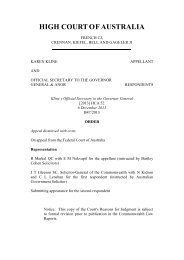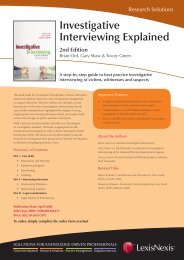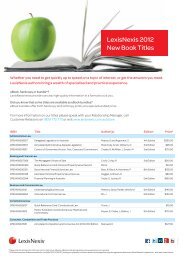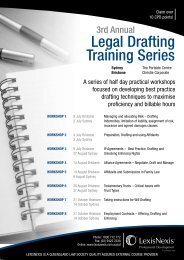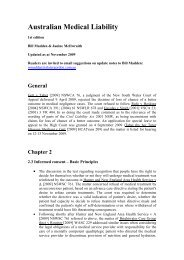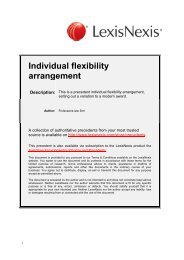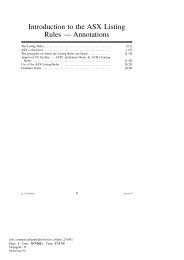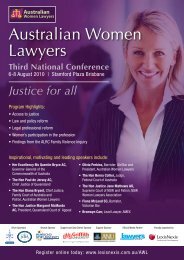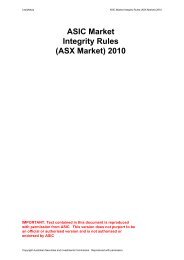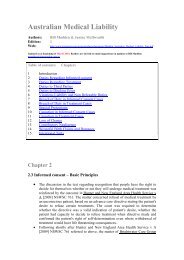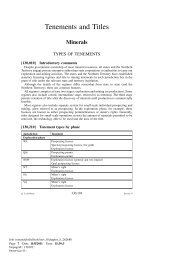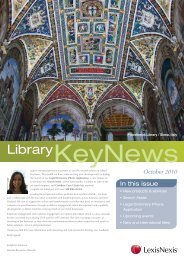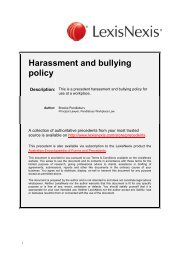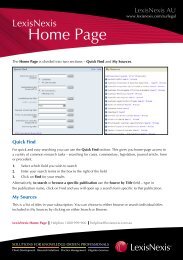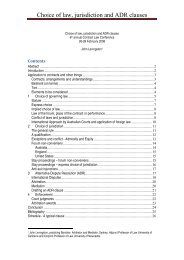AUSTRALIAN TRAVEL & TOURISM LAW - LexisNexis
AUSTRALIAN TRAVEL & TOURISM LAW - LexisNexis
AUSTRALIAN TRAVEL & TOURISM LAW - LexisNexis
Create successful ePaper yourself
Turn your PDF publications into a flip-book with our unique Google optimized e-Paper software.
<strong>AUSTRALIAN</strong> <strong>TRAVEL</strong> & <strong>TOURISM</strong> <strong>LAW</strong><br />
4 th edition<br />
Anthony J Cordato<br />
CHAPTER 4<br />
Question 1:<br />
A booking is made for a tour to Italy and Sicily. Classify these terms of the tour contract as<br />
being fundamental terms, conditions, warranties or mere representations:<br />
· Grand Tour of Italy and Sicily<br />
· 15 days from $___ *(book early and save)<br />
· Includes 3 nights in Rome, 2 nights in Venice<br />
· Highlights include (10 places nominated)<br />
· Includes full breakfast<br />
· Only ___ gives you more exclusive features in our tours that others can’t simply<br />
match!<br />
Where a term could cover more than one category, explain the circumstances in which it<br />
could do so.<br />
Answer<br />
1. Grand tour of Italy and Sicily: “a tour of Italy and Sicily” is a fundamental term, as the<br />
destinations are fundamental to the choice of the tour; while the adjective “Grand” is a<br />
representation (or warranty) as to the high standard of the tour.<br />
2. 15 days from $___*(book early and save): “15 days” is a fundamental term, if the term<br />
is greatly reduced. If is reduced by a night or two, then it is a condition.<br />
3. Includes 3 nights in Rome, 2 nights in Venice: is both a fundamental term and a<br />
condition, depending upon whether these are the most important aspects of the tour<br />
and the extent of the breach (see below).<br />
4. Highlights include (10 places nominated): is both a condition and a warranty,<br />
depending on the extent of the breach.<br />
5. Includes full breakfast: is both a condition and a warranty, depending on whether or<br />
not any breakfast is provided (see below)<br />
6. Only ___ gives your more exclusive features in our tours that others can’t simply<br />
match!: is either a warranty or a mere representation, depending on whether it is mere<br />
puff or more serious<br />
Where a choice is available, the context of the statement and the nature of the breach will<br />
determine the classification. For example if there were 2 nights, rather than 3, it would be<br />
treated as a breach of a condition, whereas if there were no nights, it would be treated as a<br />
breach of a fundamental term.<br />
#<strong>TRAVEL</strong>_<strong>LAW</strong>_Q_&_A_001.DOC
Another example is that ‘full breakfast’ could be either a condition or a warranty. If the<br />
statement advertises that a ‘full breakfast’ is to be provided for each day of the tour, and no<br />
breakfasts were provided at all during the tour, then the statement could be classified as a<br />
condition. This is because the promise is an important term of the contract in which a breach<br />
would impose a considerable additional cost to the traveller if it were breached. However if<br />
breakfast was provided for each day of the tour, but was a continental breakfast, and therefore<br />
not a ‘full breakfast’, then the breach would be a breach of warranty as it relates to the<br />
standard of the breakfast promised.<br />
Question 2:<br />
Mr Baka, who lives in Auckland, telephones Faraway Travel in Cairns, to book airfares for<br />
himself and his family from Auckland to the Maldives. Because the travel is to be less than 3<br />
weeks away, he offers to pay by credit card and to fax through the front and back of his card.<br />
Faraway Travel sends Mr Baka credit card debit forms, which he signs and faxes back. The<br />
credit card company authorises the payment and MCOs are issued for the tickets. One month<br />
later, Faraway Travel receives advice of a dispute from the credit card issuer, and requests a<br />
charge back of the fare. Advise Faraway Travel on its liability to give the charge back, and on<br />
what else it should do.<br />
Answer:<br />
It is assumed that the travel agent uses the credit card details to credit the account of the<br />
airline directly for the airfare, rather than using the credit card details to credit its own bank<br />
account, and then transferring the money to the airline.<br />
Amongst the merchant rules, which credit card issuers require its merchants to sign in order to<br />
accept credit card payments, there is a rule that the merchant’s bank account can be charged<br />
back with the amount of the transaction, if the cardholder disputes the validity of a debit. This<br />
is called a merchant’s charge back. Credit card companies will carry out a merchant’s charge<br />
back if the customer complains that the debit was not authorised, and that the card or card<br />
details have been stolen. In the case of the purchase of an air travel arrangements, the fact that<br />
the ticket issues in the name of a person other than the cardholder, means that the complaint is<br />
readily accepted by the credit card issuer, because there is no obvious benefit in a cardholder<br />
asking for a ticket to be issued in another name, unless it is for a member of the family.<br />
Because the credit card holder might only become aware of the debit when they receive their<br />
monthly statement, it is often a month after the transaction that the complaint is made and the<br />
charge back takes place.<br />
In this scenario, the charge back advice would be issued to the airline, which would then pass<br />
the charge back on to the travel agent by debiting the travel agent’s account. The question is,<br />
can the travel agent dispute the charge back?<br />
Because the travel booked is an international air fare, then the IATA Travel Agents Rules<br />
apply. Specifically, IATA Resolution 890 for ‘Card Sales Rules’ must be followed.<br />
In this scenario, Faraway Travel processed the credit card transaction without sighting the<br />
card and the card holder being present (facetoface), as required by IATA Resolution 890. It<br />
relied upon faxed copies of the card and the signature.<br />
Therefore, Faraway Travel will have no choice but to accept the charge back from the airline,<br />
because the credit card transaction has not been carried out as required under Resolution 890.<br />
It will bear the loss.<br />
Faraway Travel should mitigate its loss by cancelling any unused sectors of the trip and where<br />
possible, to obtain refunds to try to recover what monetary funds it can.<br />
#<strong>TRAVEL</strong>_<strong>LAW</strong>_Q_&_A_001.DOC
Airlines will refund the air fares for the unused travel arrangements, less cancellation fees, if<br />
the travel arrangements are cancelled before use.<br />
Generally, the air travel arrangements will be used before the fraud is discovered and the<br />
charge back is made because it is part of the fraud that the airfares are booked for flights<br />
which take place within a month. In our scenario, the travel was booked in three weeks time.<br />
Therefore in this scenario, the option of cancelling the travel arrangements and obtaining a<br />
refund will not be available because the travel has been used.<br />
If Faraway Travel is not IATA accredited, and/or books the airfare through a wholesaler or a<br />
consolidator, it will be responsible to recompense the wholesaler or consolidator for the<br />
airfare because the airline will charge back the wholesaler or consolidator.<br />
#<strong>TRAVEL</strong>_<strong>LAW</strong>_Q_&_A_001.DOC



